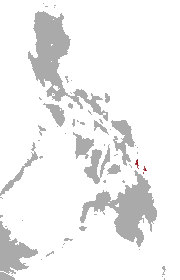
The conservation status of a group of organisms indicates whether the group still exists and how likely the group is to become extinct in the near future. Many factors are taken into account when assessing conservation status: not simply the number of individuals remaining, but the overall increase or decrease in the population over time, breeding success rates, and known threats. Various systems of conservation status exist and are in use at international, multi-country, national and local levels as well as for consumer use.

An IUCN Red List Critically Endangered species is one that has been categorized by the International Union for Conservation of Nature as facing an extremely high risk of extinction in the wild. As of 2021, of the 120,372 species currently tracked by the IUCN, there are 8,404 species that are considered to be Critically Endangered.

A species that is extinct in the wild (EW) is one that has been categorized by the International Union for Conservation of Nature as known only by living members kept in captivity or as a naturalized population outside its historic range due to massive habitat loss.
The Florida Mouse is a species of rodent in the Cricetidae family. It is the only species in the genus Podomys. It is found only in the United States.
Callitris neocaledonica is a species of conifer in the family Cupressaceae. It is found only in New Caledonia. It is threatened by habitat loss.

Villa's gray shrew is a shrew native to northeastern Mexico, where it is called musaraña.

The Somali hedgehog is a species of mammal in the family Erinaceidae. It is endemic to Somalia and Somaliland. The Somali hedgehog is nocturnal.

The Dinagat gymnure is a species of mammal in the family Erinaceidae. It is endemic to the Philippines.

Crocidura grandiceps is a species of mammal in the family Soricidae. It is found in Benin, Ivory Coast, Ghana, Guinea, Liberia, Nigeria, and Togo. Its natural habitat is subtropical or tropical moist lowland forests. It is threatened by habitat loss due to agriculture and aquaculture as well as logging and wood harvesting. To increase habitat protection for the C. grandiceps, in-place land/water protection conservation actions are in place. The vernacular name large-headed shrew is sometimes applied to C. grandiceps but has also been used for the entire related genus Paracrocidura. The IUCN List categorizes the C. grandiceps as Near Threatened as of 2008.

The Cameroonian shrew is a species of mammal in the family Soricidae. It is endemic to Cameroon. Its natural habitat is subtropical or tropical moist montane forests. It is threatened by habitat loss.

Sclater's shrew is a species of mammal in the family Soricidae. It is endemic to Mexico.

Day's shrew is a species of mammal in the family Soricidae. It is endemic to India. Its natural habitat is subtropical or tropical dry forests. It is threatened by habitat loss.

The Bornean pygmy shrew is a species of shrew in the family Soricidae. It was named for zoologist Charles Hose.
Ledermanniella letouzeyi is a species of plant in the family Podostemaceae. It is endemic to Cameroon. Its natural habitats are subtropical or tropical moist lowland forests and rivers. It is threatened by habitat loss.
Ledermanniella thalloidea is a species of plant in the family Podostemaceae. It is endemic to Cameroon. Its natural habitats are subtropical or tropical moist lowland forests and rivers. It is threatened by habitat loss.
Bat Conservation International (BCI) is an international nongovernmental organization working to conserve bats and their habitats through conservation, education, and research efforts.

The Bismarck masked flying fox is a species of flying fox in the family Pteropodidae found in Papua New Guinea and named after the Bismarck Archipelago. It was once considered a subspecies of Pteropus temminckii before being reassessed in 2001. This species has two subspecies, P. c. capistratus and P. c. ennisae. The IUCN classified it as Near Threatened in 2009, noting that the rate of decline is almost high enough to reclassify the species as Vulnerable.

A vulnerable species is a species which has been categorized by the International Union for Conservation of Nature that is threatened with extinction unless the circumstances that are threatening its survival and reproduction improve.










